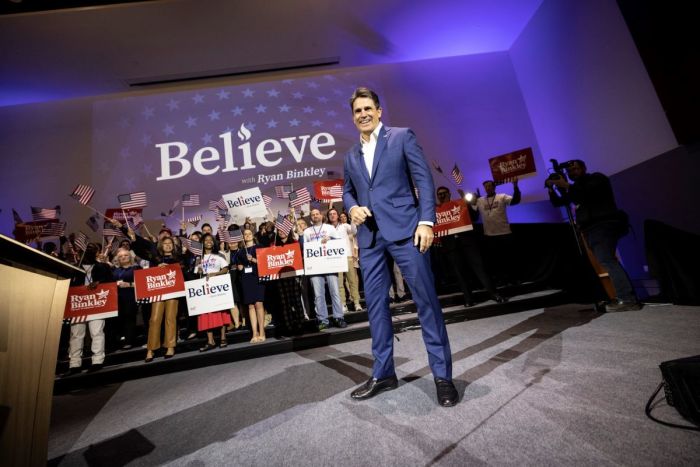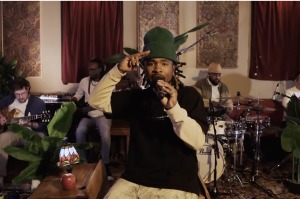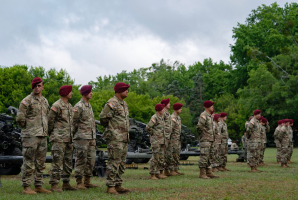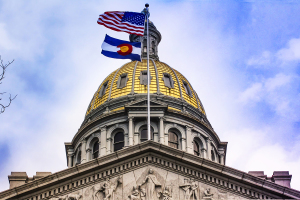Pastor, presidential candidate defends Texas law allowing schools to hire chaplains

A presidential candidate and pastor is defending the idea of putting chaplains in schools after a group of theologically progressive Christian chaplains and clergy of other religions wrote a letter urging Texas public school districts not to put volunteer or paid chaplains in their schools as a new Texas law allows them to do so.
Ryan Binkley, a North Texas-based pastor running for president of the United States as a Republican, spoke out in favor of Senate Bill 763 in an interview with The Christian Post. “I think the intent behind it is good and that’s really just to try and provide ... better counseling support for our younger generation, and I think that’s needed,” he said.
Binkley’s support for the bill comes after more than 100 inter-faith and progressive chaplains, primarily affiliated with hospice programs, hospitals, universities, prisons or the military, urged all Texas school board members to vote against the creation of a “paid or volunteer chaplain program to ‘provide support, services, and programs for students’” in an Aug. 22 letter.
The signatories urged school boards to “reject this flawed policy option,” expressing concern that “SB 763 allows a school district to give any employee or volunteer who can pass a background check the title of ‘chaplain.’” According to the chaplains, “This is simply not enough. Professional chaplains have specific education and expertise to fulfill our role in helping others engage their own religious practices and traditions.”
While Binkley suggested that school districts should have the authority to “set some rules in place” regarding the eligibility of prospective chaplains, he pushed back on the argument that “extensive training” was necessary for chaplains to positively impact the lives of young people: “Sometimes you have a lot of kids that are facing a lot of difficult issues, they’re facing emotional issues, facing depressive issues, going through trials, and I don’t know that you have to be ... an expert in every single area just to be a friend.”
The chaplains who oppose Senate Bill 763 warned that “There is no requirement in this law that the chaplains refrain from proselytizing while at schools or that they serve students from different religious backgrounds.” They contended that establishing a chaplain program in public schools would constitute “the government assertion of authority for the spiritual development and formation of our public school children.”
They added, “We would never provide spiritual care to someone without their consent. And when children are involved, parental consent is necessary. Not only are chaplains serving in public schools likely to bring about conflict with the religious beliefs of parents, but chaplains serving in public schools would also amount to spiritual malpractice by the chaplains.”
Binkley told CP that school districts should have “some guidelines” to address these concerns, suggesting that such stipulations could be: “We don’t want you to offer certain counseling [from] a certain perspective. We’d ask that you not invite them to come to your particular church to try and ... persuade them to change religions or faiths.”
While favoring measures seeking to “protect kids from ... anybody that may be trying to abuse the authority in any way,” he stressed that “an overreach of trying to avoid the possibility of anybody doing something wrong is unnecessary.”
The signatories behind the letter to Texas school boards contend that the presence of so-called “government-sanctioned chaplains” in public schools is unnecessary in light of the absence of “barriers to religious exercise” frequently experienced in other settings such as the military and prison. Additionally, they insist that they lack the qualifications for “the duties envisioned by SB 763,” specifically referring to special training for mental health professionals.
From Binkley’s perspective, Senate Bill 763 seeks to provide children with additional options, not replace trained mental health professionals: “A large majority of people are Christians in Texas and if they would like to have a chaplain there, I think they should be available. If somebody would prefer that ... their child not receive counseling from a chaplain, I think they should also be able to request that. I’m sure there are other counselors out there that are more neutral from a faith perspective.”
Binkley noted that “many kids are walking through difficult moments and if having more chaplains and counselors available can help, I think that should be beneficial. And then, in the more severe cases where somebody needs a higher level of professional help, they should be able to refer those [students] to” licensed mental health professionals.
After condemning the use of “the school safety allotment to pay for chaplains” as “wholly inappropriate,” the signatories concluded the letter by writing, “We urge you to support religious freedom and parental rights by rejecting this harmful program to have government-approved chaplains in our public schools.” They also asserted that “a strong public school system is one in which the limited funding for safety and security of students is used to hire the most skilled professionals for those roles.”
The chaplains declared “We believe that families, not the government, are entrusted with their children’s spiritual development.”
Texas’ Republican Gov. Greg Abbott signed Senate Bill 763 into law earlier this year after the Republican-controlled Texas Senate approved it in a 19-12 vote and the Texas House of Representatives passed the legislation in an 84-60 vote. The Senate vote came down along party lines, with Republicans supporting the measure and Democrats opposing it, while three Democrats in the House joined Republicans in voting for the bill.
The measure, which took effect Sept. 1, declares that “a school district or open-enrollment charter school may employ or accept as a volunteer a chaplain to provide support, services, and programs for students as assigned by the board of trustees of the district or the governing body of the school.” It stresses that such chaplains are “not required to be certified by the State Board for Educator Certification.” School boards have until March 1, 2024, to vote on whether or not to establish a chaplain program in their districts.
The law also amends existing statutes governing the use of state funds allocated to “improve school safety and security.” The revised language of the relevant statutes puts chaplains in the same category as “licensed counselors, social workers” and “individuals trained in restorative discipline and restorative justice practices.” It amends state law authorizing the use of funds to pay for “mental health personnel and support” as well as “behavioral health services” and “suicide prevention, intervention, and postvention.”
The co-authors of the Aug. 22 letter took issue with the provisions of the law, likening chaplains to mental health professionals: “We cooperate with mental health counselors — we do not compete with them. Further, professions which help children with sensitive matters, such as therapists and police investigators, typically require special training on how to interview and treat juveniles. Few chaplains have this expertise.”
In contrast to the progressive chaplains who oppose Senate Bill 763, Binkley and others see the measure as a force for good. Gordon Robertson, host of “The 700 Club” on CBN, praised it as an effective way to address the shortage of school counselors and the mental health crisis facing American youth on an episode of his program that aired shortly after the Texas Legislature approved the bill.
“Our children today need it,” Robertson said. He expressed concern about “the rate of mental illness that is happening in our high schools, our junior high schools and even in our grade schools,” which he suggested may arise from “the pandemic or the current political divide in America.”
Robertson recalled a conversation he recently had with college students, where he asked if any of them had hope for the future: “I was expecting a couple of hands to get raised. I certainly wasn’t expecting no one to raise their hand.”
“There’s a hopelessness that has hit this generation. They need help. They need to know, yes, there is a hope, there is a future for them.”
Robertson described chaplains as “ideal for getting that message across.” He shared statistics finding that, on average, Texas public schools have just one school counselor for every 392 students.
Praising Robertson’s analysis as “a great argument,” Binkley explained that “we have so many kids and so few mentors and people in their life that can help them navigate through some difficult moments relationally, emotionally, spiritually, mentally even.”
Ryan Foley is a reporter for The Christian Post. He can be reached at: ryan.foley@christianpost.com





























